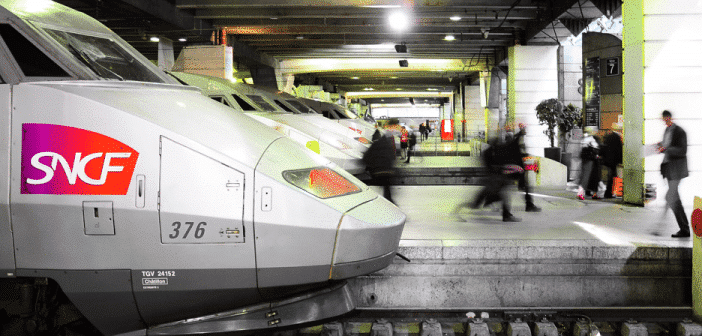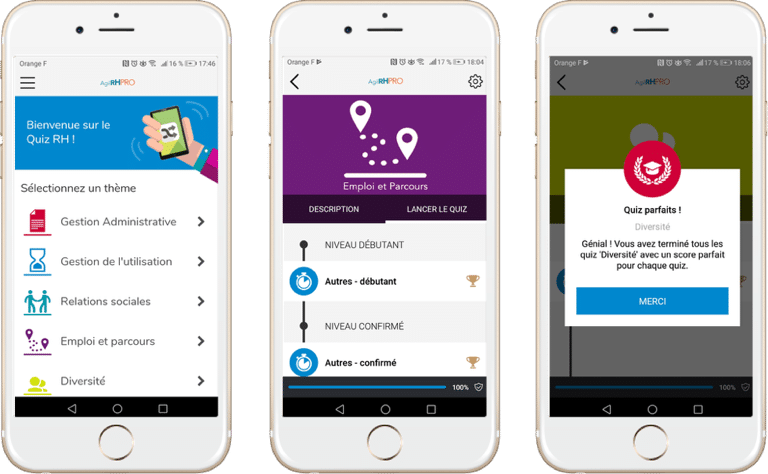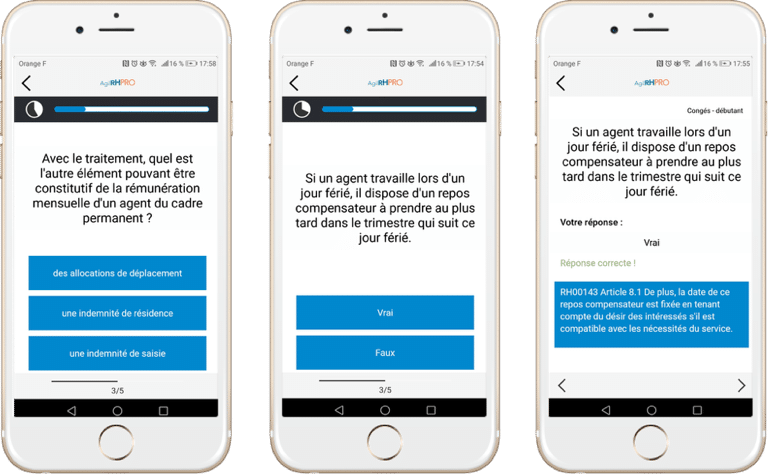The SNCF Group is one of the world’s leading providers of passenger transport and freight logistics. It offers a complete range of mobility solutions through its six business lines (including SNCF Réseau (railway infrastructure) and SNCF Gares & Connexions (station and connection solutions)). SNCF is continuing to implement its digital transformation strategy to better serve the 14 million passengers it transports each day in France and around the world. The Human Resources Department of the public rail group teamed up with Teach on Mars to set up the “HR Quiz” project, a quiz platform for its 6000 employees working in HR.
An original approach to mobile learning
When it comes to original projects, the SNCF solution is definitely up there! It makes very specific use of the Teach on Mars platform to deliver entertaining quiz activities that allow employees to understand HR rules and regulations. Although not a classic learning path leading to certification, quizzes can certainly play an important educational role.
Quizzes as learning stimuli
For Michel Barbier, HR Innovation Manager at SNCF, HR regulations and fun ways of learning aren’t a contradiction in terms – quite the opposite! “I came up with the idea that people can also learn while having fun, as they generally like doing quizzes. Topics such as HR regulations and the French labour code, which might seem dry and unappealing, can be taught using alternative methods, hence the idea of the quiz platform,” explains Michel.
An assessment tool designed to promote cultural appropriation
While self-assessment is a great introduction to the acquisition of new skills, the goal of the platform is to encourage the professional development of the entire HR sector. The aim is to help HR staff improve their skills and employability. “The real benefit of the quiz format is that it encourages people to explore new topics and improve their understanding of them.”
The length of training isn’t everything!
The SNCF team wanted to exploit the Teach on Mars solution using an MCQ (multiple-choice question) format. Each quiz lasts 1 minute and consists of 5 questions. Each question is answered in varying degrees of detail, to provide regulatory reference points and comments. “The quiz is a fast and fun solution that doesn’t require 15 to 20 minutes of free time. You can do a quiz for a minute while waiting for your bus or train, or you can do as many as you want,” explains Michel. The quiz platform is both independent and integrated into a more general HR system. The other learning formats offered in-house (face-to-face training, e-learning programmes, tutorials and COOCs) are more formal and take longer, resulting in the risk of non-completion for online solutions.
Three quiz levels to meet the needs of a diverse population
Quizzes with enough questions on the same topic are structured into three levels (beginner, advanced and expert) to engage a maximum number of users and incorporate a sense of progression. “We have separated the questions out so that learners feel they are making progress. You have to start out as a “beginner”, then you move to “advanced”, and sometimes when it comes to the “expert” questions, you realise that you don’t know all the answers even though it’s your job. This encourages you to then deepen your understanding of certain topics via a COOC, a specific e-learning course or face-to-face training,” explains Michel. The quiz has been designed for the 6000 employees who operate at different levels in HR:
- local (HR managers, training coordinators, employment managers, etc.),
- regional (HR experts who support local staff),
- central (corporate HRD personnel who develop HR strategy, implement new regulations and interpret case law, etc.).
A thematic approach replicating different staff categories
The 700 questions currently available are based on 7 themes: administrative management (remuneration, leave, etc.), utilisation management, labour relations (trade-union rights and disciplinary powers, right to strike, etc.), employment and career paths, diversity, training, and a more cross-disciplinary theme on the implementation of French rail reform. This classification into 7 groups corresponds to the different HR professions at SNCF (training managers, HR planning managers and labour relations managers, change management, etc.)..
An intuitive and successful UX
“I have to say that it’s simple, seamless, intuitive and very easy on the eye, whether on PC or smartphone. There’s no need for an instruction manual to do a quiz or use the Teach on Mars solution. In all the projects we develop at the HR Innovation Centre, we always look for the simplest and most intuitive UX for our users. Take-up of the solution went incredibly well and users have appropriated the platform without any problems. We have managed the UX issue really well,” says Michel. As a result, the platform sees high and regular levels of user participation.
Results that speak for themselves!
Deployment of the solution was accompanied by a multichannel communication plan (in-house social media, email, internal press, in-house newsletter, chat applications, etc.) to recruit as many users as possible. After nine months in use, the results are conclusive:
- 400 to 500 quizzes are done on average each week, with peaks of up to 1000 connections when a new quiz is released,
- more standardised knowledge of HR operational themes,
- the unanimous approval of users. More than just a quiz platform, the solution is a highly successful learning tool, creating a fun experience shared by more than 2000 users!
The challenge for 2019 is to raise awareness among HR employees who aren’t yet using the platform, and to enhance it with new quizzes on the latest statutory provisions and case law. “We need to keep working on further enhancements to make its success sustainable,” concludes Michel.
Three key factors for a successful mobile learning project according to Michel Barbier, HR Innovation Manager at SNCF:
- Accurately analyse your targets and their needs upstream of the project in order to give them an appropriate solution: “it’s the best guarantee of success – what’s known as “the voice of the customer” in operational excellence!”.
- Exploit multiple dissemination and communication channels to promote the solution.
- Offer varied content and upgrade it regularly.

Cornélia a enfilé sa tenue de cosmonaute en 2017 en rejoignant Teach on Mars. Elle a d’abord dédié 5 années à accompagner les clients en tant que Customer Success Manager. Elle a ensuite pris une nouvelle trajectoire en pilotant les projets de communication et de marketing avec une ambition constante : explorer la galaxie pour renforcer la réputation de l’entreprise et soutenir son développement. Animée par une approche centrée sur le client, Cornélia contribue à renforcer les relations durables, la satisfaction des clients et à soutenir la croissance de l’entreprise.




![[Mobile Learning Awards] Spotlight on IWC, winner of the Deployment Award, best practices guide](https://www.teachonmars.com/wp-content/uploads/2024/05/Visu_BestPracticesGuide3-400x250.png)
![[Mobile Learning Awards] Spotlight on Diptyque, winner of the Integrated Training Award, best practices guide.](https://www.teachonmars.com/wp-content/uploads/2024/04/visu_BestPracticesGuide2-400x250.png)
![[Mobile Learning Awards] Spotlight on Le Bon Marché, winner of the Native Training Award, best practice guide](https://www.teachonmars.com/wp-content/uploads/2024/03/Visu_BestPracticesGuide1-1-400x250.png)